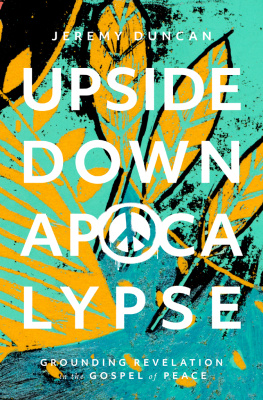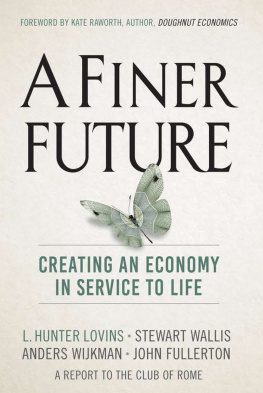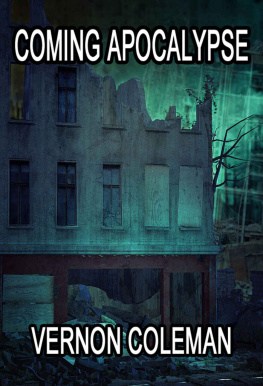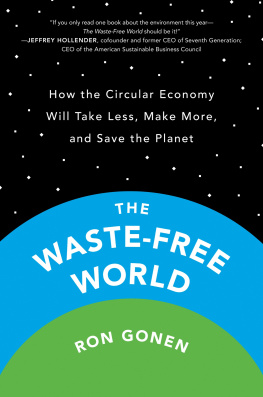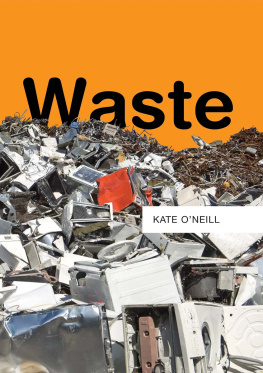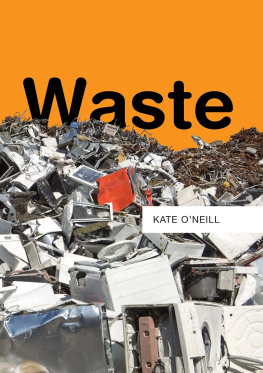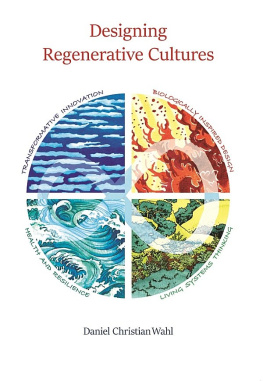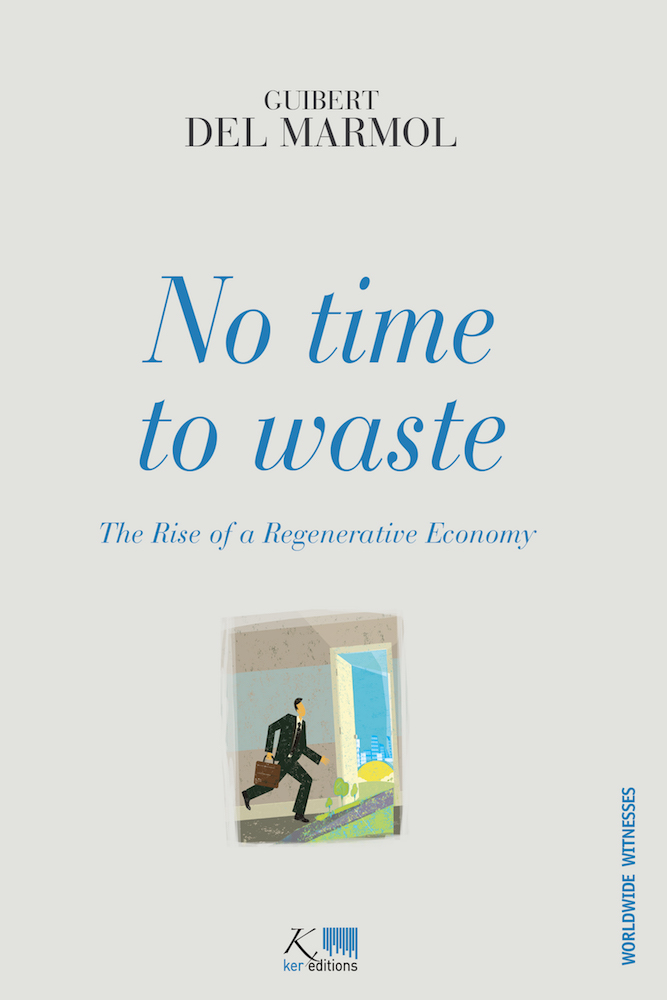To our children,
who will take part to
the construction of a new world.
To all the cracked minds
not afraid to work for a new humanity
and within whom the light
of a better world shines.
Introduction
Camus p ut it very nicely: our only choice today is to be a laughing pessimist or a crying optimist. The optimist thinks that everything is all right. In French director Mathieu Kassovitz La Haine, a man falls from the fifteenth floor of a building all the time reassuring himself: So far so good.
Our world is falling. It falls from a building that it built, when it hoped to strike a deal, after leaping into the void, that he had imagined filled with potential And although the landing matters more than the void, theres little point in relying on a golden parachute.
I like Camus idea although Im radically optimistic. I make the words of John F. Kennedy my own: The problems of the world cannot possibly be solved by sceptics or cynics whose horizons are limited by the obvious realities. We need men who can dream of things that never were. On this roof, threatened by the fall, we must measure the extent of the challenges that we will face to get back down on foot and find ourselves back on solid ground. When times are bad, situations can sometimes feel hopeless. But since we have nothing more to lose except necessities we must be prepared to try everything. You only have to open a newspaper to appreciate the crisis we are living. Lets not use the words: the crisis that we are going through, because were not going through anything. We are trapped. This crisis is polymorphic: financial, economic, climatic, demographic, moral In the era of liberal globalisation, the crisis is also global. Can it be overcome? Im not sure. Firstly because Im not alone in making this point. This crisis triggered a consciousness that lives up to the danger that it imposes on mankind. Serious studies conducted by leading universities such as Stanford or the MIT forecast that, if nothing changes, the destruction, extinction of the human species in the medium term or disappearance of all life form on the planet will happen. Time has come for the apocalypses
But the first sense of apocalypse is revelation. The word took its catastrophic connotation from St Johns revelation, in which the apostle predicts the end of the world and the coming of the Reign of God. But theres nothing preventing us from reviving this positive definition of apocalypse. On this basis we are simultaneously on the eve of renaissance or destruction. In many ways, our era is reminiscent of the Italian Trecento, magnificent moment of the Renaissance when mankind finds its place at the heart of all preoccupations and when the arts, sciences and humanist thought all blossom. Renaissance humanism results from several factors, two of which in particular: balance and the capacity to think outside the box as they didnt say in Florence. Balancing personal interest and collective necessity, ancient knowledge and technical achievements, science and morality. We hold all the ingredients to build a perennial, fairer world. A sustainable world instead of a harsh world, a shared world rather than a wasted world.
During a TED conference (one of todays most active thinking arenas) Al Gore said: We are the generation about which, a thousand years from now, philharmonic orchestras and poets and singers will celebrate by saying, they were the ones that found it within themselves to solve this crisis and lay the basis for a bright and optimistic human future. I can only stand by these words. But it requires gigantic efforts to rise up to the challenge that we face. We must radically change our approach. We must question what must be challenged and build bridges that seemed impossible or unthinkable only yesterday. We must put at work a thought articulated on a threefold alliance: offer sense to all humans; encourage resilience capacities; put the greater good at the heart of individual concerns. Choose cooperation over competition, mankind over nations, spirituality over religions.
We must not wait for a Saviour. Kafka wrote in his journal The messiah will come only when he is no longer necessary; he will come only on the day after his arrival; he will come, not on the last day, but on the very last. And we cannot let the last day come as long as we have the capacities to push back the deadline. We are the only possible saviour. We, together. Each one of us, individually, at their own level.
The solutions that we must invent and put to work must stem from a combination of expertises, individuals and populations. The majority must share a state of consciousness inclined to understand difficulties, their causes and the way forward. There is only one condition to this: give everyone the very essence of humanity, i.e. human dignity.
Dignity is not just a word. It rests on four imperatives: access to food, housing, health care and education. Any action undertaken to respond to the current world crisis must respond to these four needs.
In this way, its possible to envisage this daunting task as an unprecedented opportunity. The opportunity to change and reinvigorate our whole ecosystem: overturn our ways of producing and consuming, of designing our cities, establish trade ties, finance the economy, educate our children In a word, achieve the most fundamental but perhaps most difficult revolution, whereby the powerful will be at the service, no longer in power.
Montesquieu evoked this revolution in LEsprit des lois . According to him, virtue that institutes democracy must replace honour, which defined the aristocracy. Virtue also led to putting oneself at the service of society, not to use society to establish ones authority. Responsibilities impose more obligations than rights; by essence, they are revocable and limited in space and time. The only power that must be considered is shared action. Not control or personal gain. This change is happening. On every continent, at every level of society and knowledge, individuals design solutions to face up to these mammoth challenges.
Im not talking about alterglobalist activists or apostles of decline, and even less about the market or economic zealots supposed to solve everything and self-regulate. Im talking about individuals, organisations and corporations that have become aware of the conditions required for a long-term success. They have chosen growth based on the creation of shared values between all the actors of society. We cannot succeed on our own in a sinking world.
I owe this book to these men and women. I observed them, met them, questioned them. And by their side, in their stride, I too wanted to offer solutions, hope, the beginning of an inspiring vision. The horizon? Another model of society. Nothing less. Utopia? It lies at the heart of action and in the daily lives of all these individuals that have chosen to take on the challenge.
Another hero generation, said Al Gore. A world dies, another tries to arise. I dont have time for tears. An infant life threatened by a burdensome corpse demands all my energy. I hope to share it with you
Fundamental autonomy
I ntroduction
Autonomy: the ability to act a nd make decisions without being controlled by anyone else. Ones own guidelines. Not relying on others for ones survival, choices or ideas. But autonomy cannot be reduced to egotism, withdrawal, or selfishness. Hillel the Elder clearly differentiates both in his 2000 year-old lesson: If I am not for myself who is for me? And being for my own self, what am I? before adding a final question that clearly states the emergency of stake: And if not now, when?
Autonomy means looking out for oneself being for oneself whilst simultaneously looking out for others. Yet, the global model in which we live saw an increase in interdependent relationships, pure and simple dependencies to crucial issues including food and energy. Increasingly loud voices call for a return to a state of autarky. This was already Mussolinis reaction following sanctions targeting Italy after colonisation campaigns. Autarky is nothing but withdrawal, retirement. Moreover, autarky is an illusion in a world where it is no longer possible or desirable for a region or country to isolate itself.


